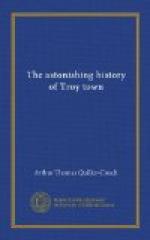“Look ’ere,” said the man at the windlass, after a bit. “Stop cussin’. This ain’t a hurdy-gurdy, and if you expec’s music you’ll have to toss us a copper.”
The owner of the bricks swore worse than ever.
Round went the windlass as leisurely as might be and another bucketful was hoisted ashore. The man on deck spat on his hands, and broke into cheerful song:—
“Was you iver to Que-bec,
Bonnie
laddie, Hieland laddie
Was you iver to Que-bec,
Rousing timber over
the deck?
Hey
my bonny laddie!
Wur-roo! my heart’s—”
The rage of the little man found extra vent.
“Look here, Caleb Trotter,” he concluded, after a full minute of profanity, “how do you think I’m to get my living and pay a set of lubberly dolts like you?”
Caleb paused with his hand on the windlass, and suggested retrenchment of the halfpenny a week hitherto spent in manners. “‘Cos, you see, all this po-liteness of yourn es a’runnin’ to waste,” he explained with fine irony.
But before the next load was more than three-parts hoisted, Caleb’s patience was exhausted. What he did was simple but decisive. He removed his hold; the handle whizzed violently round, and the bucket of bricks descended to the hold with a crash.
“Now I tell ‘ee straight. Enough’s enough; an’ I han’t got time, at my time o’ life, to be po-lite to ivery red-faced chap I meets. You can pay me or no, as you likes; but I’m off to get a drink. An’ that’s all about et; an’ wen ’tes over, ’tes over, as Joan said by her weddin’.”
With this Caleb stepped ashore, spat good-naturedly, put his hands in his pockets, and went off whistling.
At this moment Mr. Fogo, who had been on the quay long enough to hear this altercation, touched him softly by the arm.
“You said you were going to have a drink, I believe. May I go with you? I wish to ask you a few questions.”
[Illustration: “You said you were going to have a drink, I believe. May I go with you?”]
“Sutt’nly, sir,” said Caleb with a stifled grin, as he recognised the hero of the morning. “I generally patronises the ‘King o’ Prooshia’ for beer. It won’t make your hair curl, nor yet prevent your seein’ a hole dro’ a ladder: but perhaps neither o’ these is your objec’.”
Mr. Fogo, a little bewildered, replied modestly that he pursued neither of these aims. Caleb led the way across the quay, and they ascended the steps of the “King of Prussia” together.
“My object,” said Mr. Fogo timidly, as they were seated together in the low-roofed parlour before two foaming mugs—“My object was this. In the first place, I like your look.”
“Same to you, sir,” said Caleb, and acknowledged the compliment with a draught, “though ’tes what my gal said afore she desarted me for a Rooshan.”
“Are you a single man, then?”




